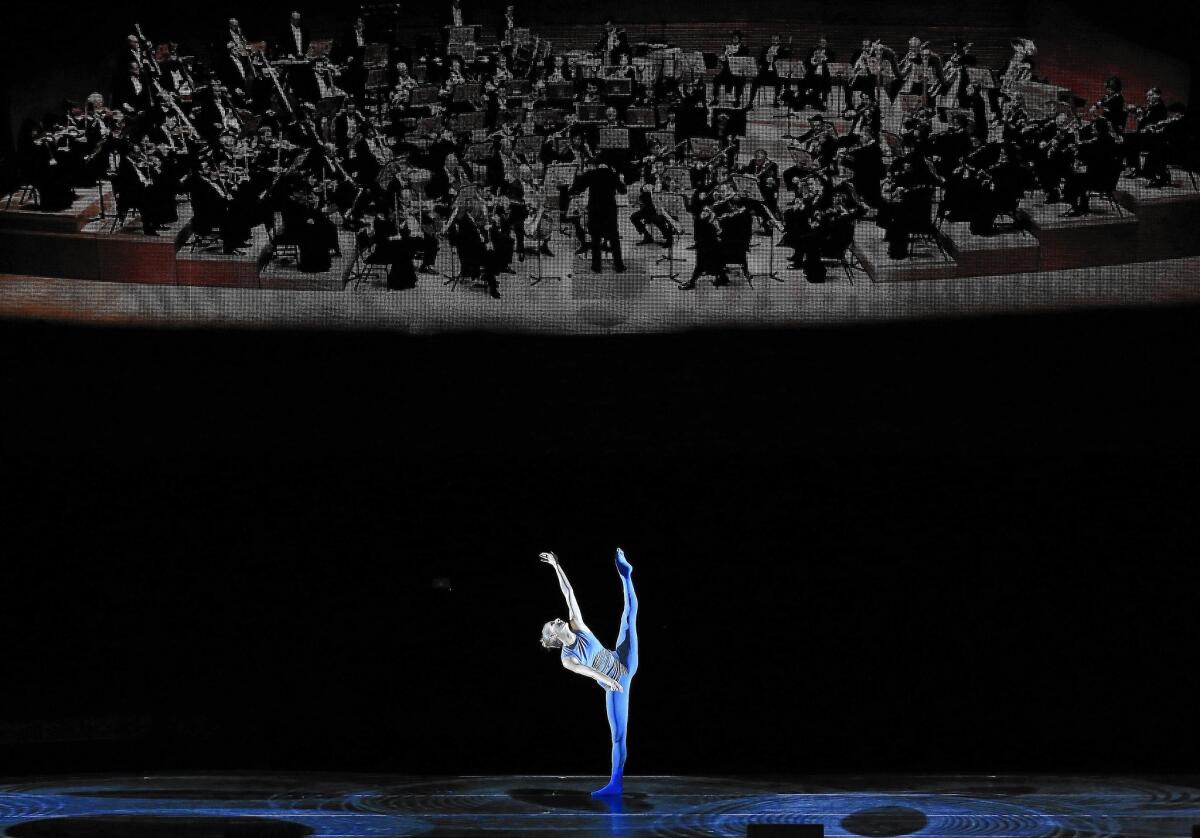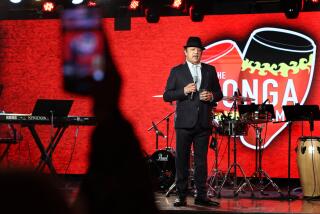Music Center and a key fundraising ally are not in harmony

The administrators of the Music Center oversee the venues at the heart of L.A.’s classical music and theater scene. The president of the Blue Ribbon leads the Music Center’s oldest and largest fundraising ally — and she’s not happy about the way things are going.
Carla Sands, who has led the Blue Ribbon since 2012, asserts that Music Center administrators spent too much money staging last year’s 50th anniversary bash at the Dorothy Chandler Pavilion. She also says they did a poor job raising money through corporate sponsorships, leading to staff and program cuts.
“Failure is not an option when it’s the 50th,” said Sands, who also sits on the Music Center board. “You don’t get to do it again next year. And you have to bring in money so it’s a thriving organization.”
Music Center officials declined to be interviewed but issued statements acknowledging fundraising problems.
“There is no question it has been challenging to grow the fundraising capacity of the Music Center over the last few years,” attorney Lisa Specht, who chairs the Music Center board, said in an email.
Specht said the Dec. 6 gala “netted a profit of $1.9 million, but other elements of the fundraising campaign haven’t been as successful.” She said the Music Center made “strategic decisions” to eliminate five positions in its education department, five positions in programming and one in fundraising as a result of the overall fundraising shortfalls.
Additionally, she said, two “senior level staff members left for new … opportunities” but will be replaced. That apparently was a reference to vice presidents for education and fundraising who left recently.
The Music Center comprises the Walt Disney Concert Hall, the Dorothy Chandler Pavilion, the Mark Taper Forum and the Ahmanson Theatre.
The private nonprofit organization receives about $25 million annually from Los Angeles County to provide maintenance, security and building management services, but most of the performances are staged by resident companies such as the Los Angeles Philharmonic and Center Theatre Group.
Sands said the Blue Ribbon, an auxiliary group founded by Dorothy Chandler in 1968, collectively donated nearly $2 million to the gala by buying tickets to the show or tables at the post-performance dinner.
Months before the event, Sands said she and other Blue Ribbon members became concerned that a golden fundraising opportunity was being squandered.
“I don’t believe the staff or leadership of the Music Center knew how to raise money, and that’s the bottom-line job,” said Sands, who previously had served on the Los Angeles Philharmonic’s board. “I think it’s [a question of] leadership and vision.”
Sands said they didn’t take advantage of offers by Blue Ribbon members to recruit star performers and said the Music Center failed to line up big corporate sponsors to help cover costs.
Unlike its resident orchestra company, the Music Center doesn’t stage an annual gala fundraiser. Sands said the inexperience showed.
“The lack of leadership is the crux of this,” said Karen Bedrosian Coyne, another Blue Ribbon member who said she shared Sands’ concerns. “If we had a strong leader who has the house in order, these things don’t happen.”
Los Angeles attorney Neal Millard resigned his seat on the Music Center board early this year, partly out of frustration over leadership and fundraising.
“The Music Center is kind of stagnating,” Millard said. “Everyone has their hearts in the right place. It’s the ability to raise money that’s the challenge.”
Unlike some other L.A. arts organizations, the Music Center hasn’t seen a rebound in contributions amid the economic recovery from the Great Recession.
Public financial statements show that in the four fiscal years from mid-2005 to mid-2009, the Music Center raised $24.5 million a year, on average. In the five ensuing fiscal years, donations averaged $10.2 million. Instead of building its board during the 50th anniversary season that ends this spring, the Music Center saw its roster dwindle from 42 last June to the 36 trustees now listed on its website.
Specht, the Music Center board chair, said fundraising from 2005 to 2009 was unusually strong, in part because a campaign was on to fund the $30-million renovation of the Mark Taper Forum that was completed in 2007.
The Music Center’s paid staff has been led by Howard Sherman, its longtime chief operating officer, since former chief executive Stephen Rountree stepped down late last year to become an executive with Center Theatre Group. Specht said that fundraising will be a significant part of the new chief executive’s job and that she expects an announcement this summer on the position.
While the Music Center stalls, one of its leading peers, New York’s Lincoln Center, recently announced it had received $100 million from David Geffen to renovate its main concert hall.
The donation sparked speculation as to why the Music Center hadn’t managed to court a big gift from Geffen, who made his fortune in L.A. and has been known to attend L.A Philharmonic concerts.
Warner Henry, a board member of Los Angeles Opera, said the Music Center’s leadership has failed to spark cooperation among the arts companies that stage performances in its venues, acting instead as a disinterested landlord.
“The … relationship the Music Center has with its resident companies is arm’s-length, remote, not collaborative,” Henry said. “Each resident company is in its own little private world; collaboration is not encouraged.”
Sands said that she’s pressing for more information about the gala’s finances because it’s important for donors to know how their money was spent and why the results fell short. After exchanging letters with interim president Sherman in early March, she met with Music Center finance managers on March 25 to go over contracts and invoices in detail. She was not reassured.
“There were accounts written by hand on some pages,” Sands said. “I was expecting to see accounting in good order, but they don’t seem to have any idea what they spent. How can any organization be run that way?”
Sands, whose husband, Los Angeles real estate and investment executive Fred Sands, is president of the board of L.A.’s Museum of Contemporary Art, said she sent a dozen detailed follow-up questions in writing after the meeting on such matters as the Music Center’s contract with Corporate Magic, a Dallas-based events company that produced the Dec. 6 show. She said she’s still waiting for answers.
The show that was produced was critically panned, Sands noted in a March 6 letter to Music Center officials.
“I would imagine Dorothy Chandler was turning over in her grave that night,” she wrote.
More to Read
The biggest entertainment stories
Get our big stories about Hollywood, film, television, music, arts, culture and more right in your inbox as soon as they publish.
You may occasionally receive promotional content from the Los Angeles Times.








